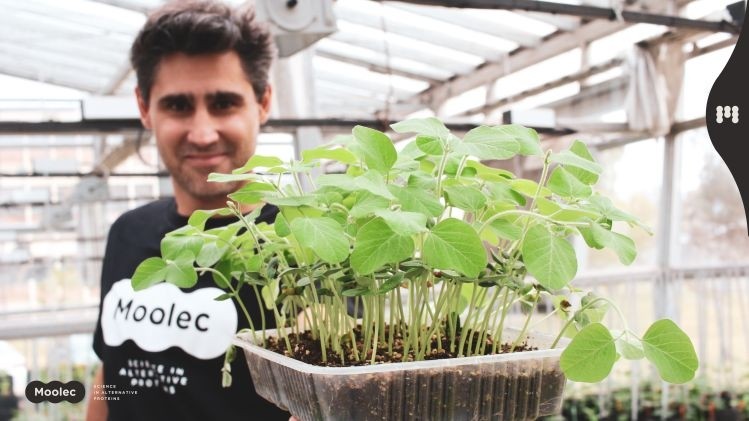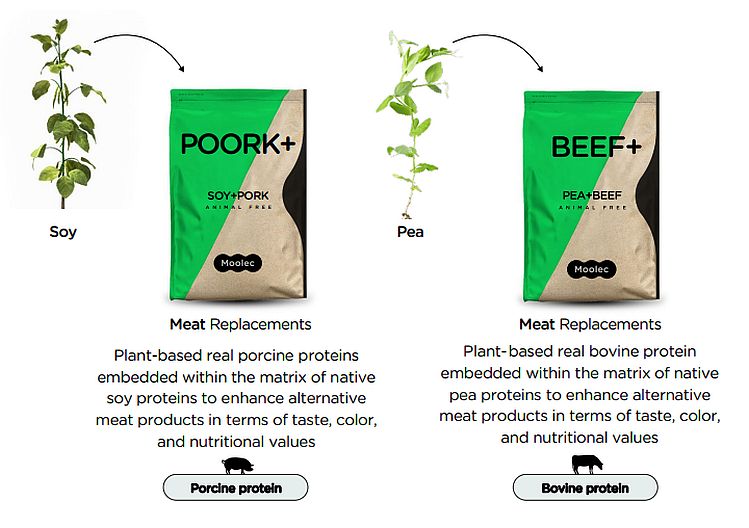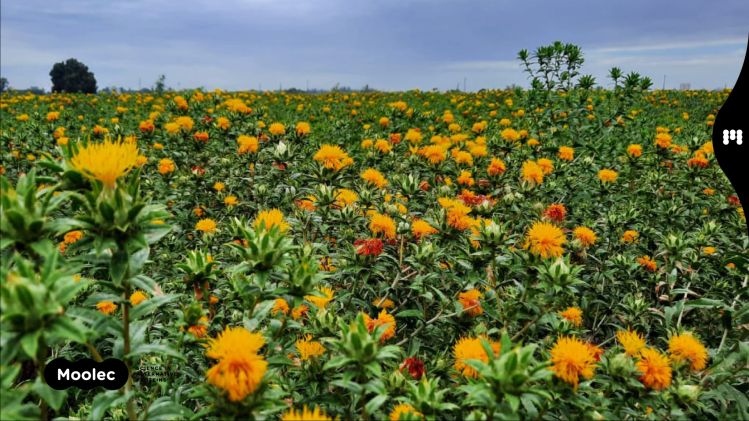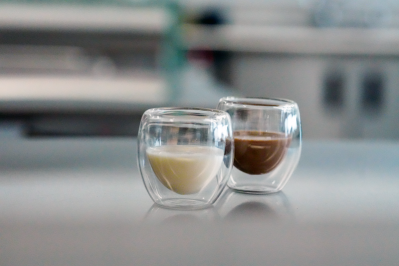Animal proteins... made by plants? 'Molecular farming’ co Moolec Science to go public via SPAC

A spinout of ag biotech firm Bioceres Crop Solutions, with staff in the US, Argentina, the UK, and the Netherlands, Moolec has entered into a definitive business combination agreement with a SPAC called LightJump Acquisition Corp in a deal that sets its proforma equity value at $504m (assuming no redemptions from SPAC investors and prior to transaction expenses).
Upon closing, the combined company - Moolec Science SA - is expected to be listed on Nasdaq under the ticker symbol MLEC, said LightJump CEO Robert Bennett on a call this morning: "Moolec is a company with a very large market opportunity, defensible moats, and a unique and differentiated business model. Moolec Science develops real animal proteins in plants using molecular farming, a scalable, cost-effective and resource-efficient technology.”
Cash proceeds from the transaction will primarily be used on R&D, regulatory approval efforts, and accelerating the commercialization of Moolec’s first two products: Chymosin SPC, a bovine protein (enzyme) used in cheesemaking; and a nutritional oil containing gamma-linoleic acid (GLA), which are both expressed by a genetically engineered strain of safflower.
Both products, said Moolec, “have been cleared by regulatory authorities and the company is currently ramping up seed inventories.”
Meat proteins... from plants?
Next, Moolec is targeting the meat alternatives market with ingredients from yellow pea and soy crops that have been modified to produce bovine and porcine proteins that Moolec claims can improve the taste, texture, nutrition, flavor, and color of meat alternatives.
Moolec has not provided many details on this second wave of products, but co-founder and CEO Gaston Paladini told FoodNavigator-USA in a recent interview that, “We are focusing on proteins from the blood and the muscles of animals that can improve taste, nutrition, flavor, coloring... the organoleptic properties and texture of meat alternatives.”
Asked whether he was talking about meaty-tasting proteins such as myoglobin, which Motif FoodWorks is expressing in a genetically engineered strain of yeast, he said: “There are plenty of different proteins and molecules in meat that nobody has explored yet.
“We want to replicate the whole experience using plants not only as a host to produce a particular meat molecule, but we also want to combine the matrix of the plant proteins and these [animal] proteins,” which might mean a soy protein isolate that also contains bovine protein, or a yellow pea protein that also contains porcine proteins, for example.
“We want to combine the foreign molecules with the bulk plant protein. We're not modifying the natural and native soy proteins of the plant with the addition of the animal proteins, so we’ll be selling, say, soy protein isolate with real meat protein inside.”


‘For molecular farming, the infrastructure is already there’
But why is molecular farming more efficient than genetically engineering microbes to express animal proteins in bioreactors via precision fermentation, as The EVERY Co, Geltor, Perfect Day et al. are doing?
It all depends on the protein, said Paladini, who recently teamed up with pharma co Grupo Insud to form a precision fermentation joint venture using microbes such as yeast and fungi to express proteins and other ingredients in tanks.
“The main challenges for precision fermentation right now are scale and cost,” said Paladini, “as they still have a kind of pharma infrastructure. For molecular farming, the infrastructure is already there, the soybean growers are already there, you just need to switch the seeds. We are leveraging biology and sunlight, whereas bioreactors need a huge amount of energy.”
He added: "It can make sense to use precision fermentation for specific proteins in specific applications, but the market will still be limited to high value applications in premium markets."
“We can reach economies of scale by using low input and high tech traditional farming, which is an infrastructure that exists globally.” Amit Dhingra, CSO, Moolec
No need to modify the downstream process: ‘We can recover the foreign molecules (eg. the ‘animal’ proteins) together with the plant protein’
As for downstream processing, he said, “We are proving with our own pilot plants and partnerships, that we could use the same infrastructure, recovering both [plant and animal proteins] without modifying the current downstream process. We can recover the foreign molecules (eg. the ‘animal’ proteins) together with the plant protein.”
Clearly one advantage of using microbes over plants, however, is at the R&D phase, when rapid iteration is the name of the game, he acknowledged (it takes days to see if yeast or bacteria expresses a protein, whereas peas and soybeans grow rather more slowly, which means you have to run a lot of tests in parallel).
“We're talking about biology here, so it will take longer, but it’s totally worth it.”
The business model: ‘We are in active conversations with potential partners’
Asked about the business model, he said, “We are in active conversations with potential partners such as ingredient processing companies that are interested in our technology, so we have the option to license our IP, or to work with them in the downstream processing stage to recover the proteins and use their networks to commercialize them.
“In some markets it might make sense to outsource the downstream process and commercialize products directly to food producers, so we are very flexible to adapt our model to different territories.
“We are also shaping agreements directly with food producers to prototype our products in their pilot plants and in commercial formulas, so we are learning a lot.”
Terminology: 'We are producing real animal products, so it's not exactly ‘animal free’
On labeling - a thorny issue given the paradoxical nature of the endeavor, producing animal proteins… without animals - Paladini said: “We are producing real animal products, so it's not exactly ‘animal free,’” a term popularized by some players making dairy products featuring casein produced by microbes instead of cows.
“I would prefer cruelty-free," said Paladini, "but we need to start thinking about this as an industry. Is it plant-based [which could confuse consumers, especially with allergies], or plant-made [which may be accurate, but may not be very clear]? We definitely need to be transparent with the final consumer.
“In our case, our [meat] proteins are not allergenic, so we may not have the same issue as with the dairy proteins [produced via microbial fermentation, which must feature milk allergen warnings], but we still need to say in a very straightforward way, this is a real animal protein made in a cruelty-free way.”
Proudly pro-GMO
Moolec, which is part of the new ‘GM4GOOD’ initiative, which advocates the use of genetic modification technologies in the agri-food value chain, describes its wares as "proudly genetically modified," he said.
“We believe we need to start educating, communicating and informing consumers and the industry, about the benefits not only of modified plants, but all kinds of applications, including precision fermentation,” added Paladini, who said he hoped a new generation of consumers would take a more nuanced view of GM technologies, which had myriad applications in the food industry well beyond traditional herbicide tolerance or disease resistance.
Go to market strategy, regulatory: ‘We didn’t start from scratch’
As for the regulatory pathway forward, Paladini acknowledged that the GMO factor presented challenges in some markets, but added: “We’re having conversations with regulators, but we already have two products approved [he highlighted the safflower-derived products and noted that the team that formed Moolec had been working on the technology for a decade before it was spun off from agri-tech co Bioceres Crop Solutions].
“So we’re not the typical startup; we didn't start from scratch… when we started [in the fall of 2020], we already had more than 20 patents.
"Based on our GLA safflower experience for GRAS approval, we have a clear understanding of what are the steps to follow in achieving a successful regulatory pathway."
From a geographical perspective, he said, “We are focusing on North America, Mexico, and the United States, where we have partnerships with third parties in greenhouses and laboratories including at Washington State University. Compared with the EU, the United States is a GM friendly country, and we are proudly making GMOs. But we still believe there is a chance we could have our products in parts of Europe.”
In addition, Moolec's Molecular Farming platform has the potential to modify and other plants such that they can express animal proteins, opening up opportunities in “milk, egg, chicken and fish replacements, or other alternative biomaterials and cosmetics,” said the firm.
*Sometimes called 'blank check' companies, SPACs are shell companies that raise funds in an IPO with the aim of acquiring a private company, which they then merge with, enabling the target company to go public more rapidly than were it to IPO directly.


















